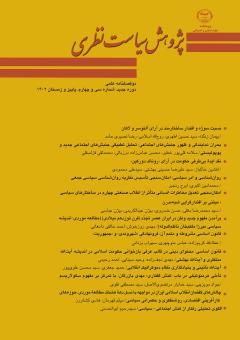روانشناسی و امر سیاسی؛ امکانسنجی تأسیس نظریه روانشناسی سیاسی جمعی
محورهای موضوعی : پژوهش سیاست نظری
محمدامین اکبری
1
,
ایرج رنجبر
2
![]()
1 - دانشجوی دکتری گروه علوم سیاسی گرایش مسائل ایران، واحد کرمانشاه، دانشگاه آزاد اسلامی، کرمانشاه
2 - استادیار گروه علوم سیاسی، واحد کرمانشاه، دانشگاه آزاد اسلامی، کرمانشاه
کلید واژه: روانشناسی سیاسی, ناخودآگاه جمعی, کهنالگو, خوی اجتماعی, پدرسالاری.,
چکیده مقاله :
بررسی امکان تأسیس نظریۀ روانشناسی سیاسی جمعی با وامگرفتن از آرای «زیگموند فروید»، «کارل گوستاو یونگ» و «اریک فروم»، مسئله اصلی این مقاله است. ذهنیت نویسندگان بر این دغدغه استوار بوده که با غفلت نظری نسبت به آن دسته از آرای روانشناسان که شرایط امکان ارزیابی کنشهای سیاسی جمعی و تحلیل روانکاوانۀ گروهها، سازمانها، جریانهای سیاسی و جوامع بیمار را در اختیار ما قرار میدهد، موضوع روانشناسی سیاسی در بعد جمعی خود مغفول مانده و صرفاً در پرتو روایت تاریخانگارانه و گذشتهگرا به روانشناسی افراد و شخصیتهای برجستۀ سیاسی محدود شده است. این رویکرد نظری هرچند در رفتارشناسی سیاستمداران و واکاوی ریشههای تصمیمهای عمومی آنها توفیق نسبی داشته، با خلع ید خود از ابزار روانشناسی سیاسی جمعی، نمیتواند به پژوهشگران پاسخی اقناعکننده درباره چرایی رفتارهای مشترکِ جمعی یک جامعه، سازمان و یا گروه سیاسی بدهد. از اینرو نویسندگان تلاش کردهاند تا با روش توصیفی- تحلیلی، بر مبنای جمعآوری کتابخانهای از موضِعی متاتئوریک، طرحوارهای نظری را ارائه دهند که در آن با ابتنا از رانهها و ریشههای فرهنگی، اجتماعی، اقتصادی، ایدئولوژیک، سیاسی و تاریخی مشترک موجود در ناخودآگاه جمعی جامعه که خوی روانی آنان را تشکیل داده و ضمن تولید فردیت منفی عوارض نوروتیک را در جامعه به جای میگذارد، رهیافتی نو برای روانشناسیسیاسی جمعمحور به دست آورند.
The main issue of this article is to explore the possibility of establishing a collective political psychology theory by drawing on the views of Sigmund Freud, Carl Gustav Jung, and Erich Fromm. The authors are concerned about the lack of attention given to the theoretical framework provided by psychologists who assess collective political actions and analyze psychoanalytic aspects of groups, organizations, political movements, and troubled societies. They believe that this aspect of political psychology has been neglected. They also believe that the subject of political psychology has been limited solely to the psychology of individuals and prominent political figures, within the framework of a narrative that is historical and past-oriented. While this theoretical approach has had some relative success in behavioral psychology of politicians and exploring the roots of their public decisions, it cannot provide convincing answers to researchers about the reasons behind the collective behaviors of a society, organization, or political group by divorcing itself from the tools of collective political psychology. Hence, authors have attempted to provide a theoretical framework through a descriptive-analytical method, based on collecting a library of metatheoretical positions. In this framework, by considering the paths and cultural, social, economic, ideological, political, and historical roots common in the collective unconscious of society that constitute their psychological disposition, and replacing the production of individual negativities with neurotic consequences within society, they aim to achieve a novel approach to collective-focused political psychology.
Keywords: Political psychology, collective unconscious, archetype, social disposition, patriarchy.
